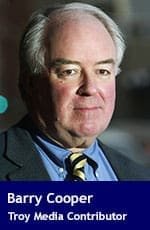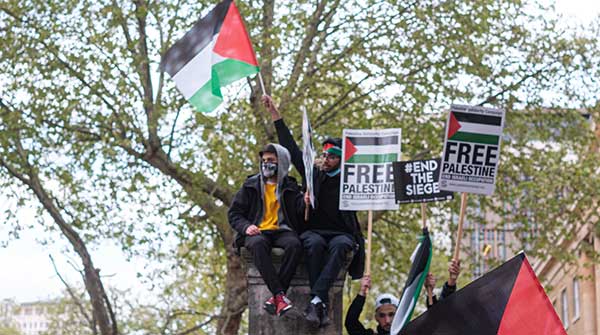Protests and identity politics are the result of the cowardly response of university administrations
 From UCLA and UBC on the West Coast to McGill to Columbia on the East Coast, the student and non-student occupations of North American university campuses have advanced at least four common demands.
From UCLA and UBC on the West Coast to McGill to Columbia on the East Coast, the student and non-student occupations of North American university campuses have advanced at least four common demands.
First, they demand no repercussions for their behaviour, even if it is illegal and violent. At UCLA, they also demanded free vegan and non-gluten meals, although there was no demand for kosher food.
Second, they call for a freeze on any academic and financial contact between their universities and Israeli institutions, as well as with Zionist funding.
Third, they seek to indulge in pro-Hamas activities via groups like the Palestinian Youth Movement and Samidoun, which are affiliated with the Popular Front for the Liberation of Palestine (PFLP), a group listed as a terrorist organization by both Canada and the U.S.
Fourth, occasionally, as seen at UBC, U of T, and McGill, the organizers include First Nations in their actions.
In essence, these individuals want to dictate university policies without facing any consequences. They are driven by a desire for power. To understand these events, we need to consider their motivations.
Today’s activists, like the young romantic poet William Wordsworth during the French Revolution, see themselves as on the side of the angels. Inspired by figures like Greta Thunberg, many protesters experience their first taste of community in these encampments.
They claim to care for the plight of Palestinians, but they ignore the role of Hamas in that misery. Many protesters cover their faces with masks or keffiyehs, claiming it’s to avoid facial recognition. However, their real motivation might be a lack of courage to stand openly by their convictions, preferring anonymous gestures of moral superiority.
In commonsensical terms, their motives are corrupt. They know full well that terrorists, not the IDF, are behind the misery of the Palestinians, and, secretly, they are ashamed of themselves. But they can never admit it.
Some commentators compare today’s protests to those of 1968. At the Paris Institute of Political Studies (Sciences Po), a sign recently read “Gaza = Vietnam,” echoing sentiments from 1968. However, the protests of 1968 were against a genuinely unjust war, not the imagined injustices targeted today. Back then, it was also possible to debate various sides of the Vietnam War without seeking to cancel opposing views.
Today, the combination of self-righteousness, siloed opinions, ignorance, and echo chambers makes it impossible to acknowledge the complexity of reality. As Marx noted, history repeats itself first as tragedy, then as farce.
The cowardly responses of university administrations have further eroded personal agency and responsibility. Embracing extreme identity politics and making unenforced threats have solidified their moral failings. For instance, when Columbia’s president, Nemat Shafik, announced remote classes for the rest of the term, she effectively admitted losing control of the university, rewarding rioters and penalizing students who pay over US$68,000 to attend.
Conversely, University of Florida president Ben Sasse took a firmer stance, stating, “The University of Florida is not a daycare, and we do not treat protesters like children.” Protesters faced consequences for their actions, including enforcing the law, expelling students, and deporting non-citizens.
Of Columbia’s 26,000 students, only a few hundred (fortified by non-students) participated in the disruption, a small minority likely replicated across the continent. The election of Maya Patek, a former IDF member and proud Israeli, as president-elect of Columbia’s School of General Studies, suggests that most students do not support the protesters’ actions.
Finally, questions arise about funding for the protests. Who paid for the tents? And for a group of people who couldn’t start a lawnmower, let alone a revolution, who paid for the organizers to organize them?
Howard Levitt reported in the Financial Post that Canada has become a major venue for money laundering from the Middle East, particularly Qatar. The Wall Street Journal noted funding from known terrorist groups and shadowy outfits like “Students 4 Gaza” and the International Marxist Tendency. The New York Post reported that many organizers were funded by the Open Society Institute, though the Jerusalem Post disputed this because George Soros, who funds the institute, is Jewish.
All these conduits point to Iran, the chief beneficiary of campus disruptions and a major sponsor of global terrorism. Shiraz University in Tehran has even offered expelled students scholarships.
We should encourage these students to accept and perhaps learn something valuable.
Barry Cooper is a professor of political science at the University of Calgary and a Senior Fellow at the Aristotle Foundation for Public Policy. Author of 35 books and 200 studies, his book on terrorism was recovered by Seal Team Six during their visit to the Osama bin Laden compound in Abbottabad in May 2011.
For interview requests, click here.
The opinions expressed by our columnists and contributors are theirs alone and do not inherently or expressly reflect the views of our publication.
© Troy Media
Troy Media is an editorial content provider to media outlets and its own hosted community news outlets across Canada.

